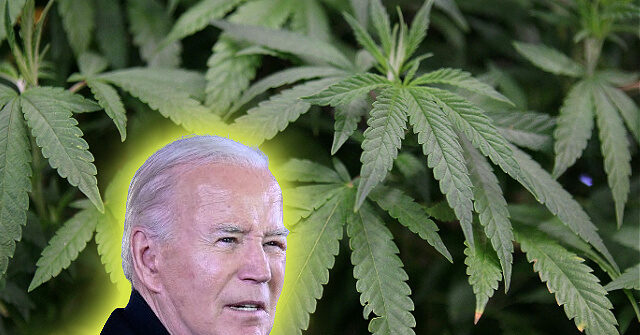

President Joe Biden’s administration will reportedly loosen laws regulating cannabis (marijuana), which some advocates say amounts to only a symbolic gesture that will ultimately change nothing.
The president will reportedly move cannabis from the maximally restrictive Schedule I to the minimally restrictive Schedule III of the Controlled Substance Act (CSA), according to the Guardian.
“That would lessen the tax burden on businesses selling the drug in states where it is legal and potentially change how police agencies view enforcement of marijuana laws,” noted the outlet.
David Culver, senior vice president of public affairs for the U.S. Cannabis Council, a trade group, said that lowering the restriction to Schedule III will be the turnaround that the cannabis industry desperately needs.
“If it’s going to be finalized at schedule III, it’s going to be the moment that the industry can turn the corner and we begin to see the growth in the cannabis space amongst the legal operators that we’ve been waiting on for so long,” said Culver.
Some advocates have said the move amounts to little more than a symbolic gesture that will do little to eliminate the burden that private cannabis sellers and growers experience. For instance, while 38 states have approved cannabis for medical or commercial use, the substance still faces the same restrictions as heroin on the federal level. Despite it being legal in certain states, the industry has had to contend with serious federal setbacks that will likely not go away, according to Paul Armentano, deputy director of the National Organization for the Reform of Marijuana Laws (Norml).
“Classifying it as Schedule III would make every existing state cannabis law that’s currently inconsistent with federal law as equally inconsistent going forward. So, it doesn’t solve any of the problems before it,” Armentano said.
“It needs to be rescheduled for logistical reasons, for practical reasons, because we have a system right now where the majority of states are choosing to regulate marijuana as a legal commodity through their own state-specific systems, and that act is not permitted for any substance that is in the CSA. That is only permitted for substances that are not scheduled,” he added.
Kevin Sabet, president of Smart Approaches to Marijuana, said that lowering the classification will further hurt public health.
“It’s going to ramp up commercialization, it’s going to ramp up the marketing and the glamorization of marijuana,” Sabet said. “It’s going to do that both in a practical way with this deducting expenses, and it’s going to do so in a global way, by just sending the message that this is harmless.”
As Breitbart News reported last year, a study shows that marijuana use has reached record levels for young adults and may soon become a practice among the majority. According to a Monitoring the Future study by scientists at the University of Michigan’s Institute for Social Research, marijuana and hallucinogen use steadily climbed among young adults between 19 and 30 compared to just ten years ago:
Past-year, past-month and daily marijuana use (use on 20 or more occasions in the past 30 days) reached the highest levels ever recorded since these trends were first monitored in 1988. Marijuana use in the past month was reported by 29% of young adults in 2021, compared to 21% five years ago (2016) and 17% 10 years ago (2011). Daily marijuana use also significantly increased during these time periods, reported by 11% of young adults in 2021, a significant increase from 8% in 2016 and 6% in 2011.
Past-year hallucinogen use had been relatively stable over the past few decades until 2020, when reports of use started to increase dramatically. In 2021, 8% of young adults reported past-year hallucinogen use, representing an all-time high since the category was first surveyed in 1988. By comparison, in 2016, 5% of young adults reported past-year hallucinogen use, and in 2011, only 3% reported use.
Alcohol still remains the popular substance of choice among young adults, while binge drinking and high-intensity drinking has seen an uptick since the pandemic.
The study came months after a U.K. study published in the journal Lancet Psychiatry showed people who use cannabis with a THC potency above five to ten milligrams per gram have a higher risk of addiction and mental health problems. Study co-author Tom Freeman, director of the addiction and mental health group at the U.K.’s University of Bath, told CNN in an email at the time that high-potency cannabis users have a “four-fold increased risk of addiction” over low potency cannabis users.
“A report by the United Nations found that in the past two decades, the proportion of people seeking treatment for cannabis addiction has risen in all world regions apart from Africa,” he said.
Roughly three in ten people in the United States have been diagnosed with marijuana addiction, according to statistics from the U.S. Centers for Disease Control and Prevention (CDC). Likewise, the European Monitoring Centre for Drugs and Drug Addiction found a 76 percent increase in treatment for marijuana addiction over the past decade.
Paul Roland Bois directed the award-winning feature film, EXEMPLUM, which can be viewed for FREE on YouTube or Tubi. A high-quality, ad-free stream can also be purchased on Google Play or Vimeo on Demand. Follow him on Twitter @prolandfilms or Instagram @prolandfilms.





